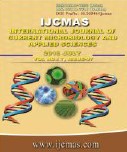


 National Academy of Agricultural Sciences (NAAS)
National Academy of Agricultural Sciences (NAAS)

|
PRINT ISSN : 2319-7692
Online ISSN : 2319-7706 Issues : 12 per year Publisher : Excellent Publishers Email : editorijcmas@gmail.com / submit@ijcmas.com Editor-in-chief: Dr.M.Prakash Index Copernicus ICV 2018: 95.39 NAAS RATING 2020: 5.38 |
A nursery experiment was conducted to evaluate the efficacy of different biological agents such as Pseudomonas fluorescens (Pfbv 22), Bacillus subtilis (Bbv 57), Trichoderma viridi, Biodynamic compost and AM fungi on root knot nematode management in black pepper. The study indicated that all the biological agents were found to have potential to increase significant plant growth in terms of number of leaves and plant biomass. The maximum number of leaf per plant was recorded in P. fluorescens (Pfbv 22) treated plants (40 per cent) significantly different from untreated control followed by B. subtilis (Bbv 57), Biodynamic compost, AM fungi as 25 per cent. Among the treatments T. viridi and carbofuran registered the minimum number of leaf 3. The maximum plant biomass of 50 per cent was recorded in P. fluorescens (Pfbv 22) and it was on par with Biodynamic compost and AM fungi. The next best treatment was B. subtilis (Bbv 57) (37.5 per cent) and it was also on par with AM fungi treatment. The M. incognita alone recorded least bio mass of 20 g. The population of root knot nematode M. incognita in soil and roots were significantly lower in all biological agents treated cuttings than untreated control. The percent reduction in nematode population in soil, egg mass/g and adult female nematode/g was maximum in P. fluorescens with 60.1, 41.2 and 38.1 percent respectively over untreated control.
 |
 |
 |
 |
 |